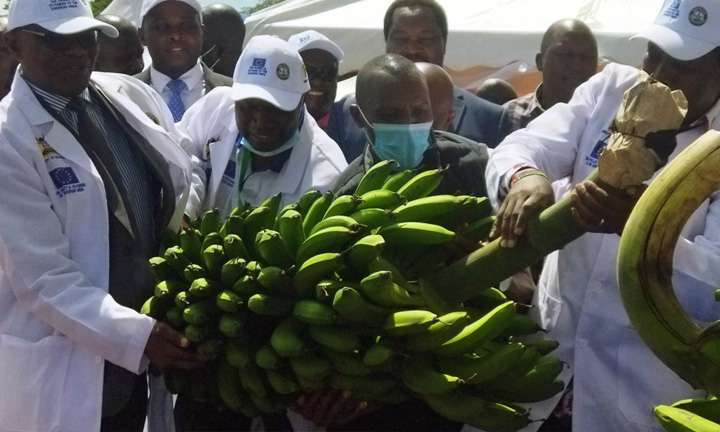SOURCE: Mercy Osongo, Kenya News
The acting Devolution Cabinet Secretary, Eugene Wamalwa Tuesday commissioned a banana processing plant on the outskirts of Kisii town.
Speaking during the function which was held at the plant site, Wamalwa said the banana plant is well-placed in a county that is one of the leading producers of bananas in the whole world.
“The processing plant will in effect not lack raw materials to process. It is our hope that this will contribute to the steady income of producers and other value-chain actors. It is also worth mentioning that the plant comes at an opportune time as it will provide an alternative market for producers,” said the CS.
Wamalwa pointed out that the factory will be expected to minimise the role of middlemen and improve the sale margins for producers thereby enhancing the county’s revenue base through levies on producers from the factory.
He said the processor had been funded at a cost of Sh158 million, with the county government catering for over Sh40 million and the European Union (EU) contributing Sh110 million.
State Department for Devolution Principal Secretary (PS), Julius Korir said the Ministry is excited about the project as it will greatly impact farmers, banana value-chain actors, the county and country as a whole.
“At the same time, it will achieve its inter-governmental role of fostering a good working collaboration and consultation with the counties. This is a mandate that we as the Ministry look forward to deepening,” Korir added.
The PS noted that the Ministry was looking forward to spreading the local economic development initiative to the rest of the counties since 15 counties were part of the pilot programme and the impact has been greatly felt.
EU Representative, Stephen Wahome said they were proud of the collaboration between national and county governments and projects such as the banana plant is proof that the system of devolution that Kenyans chose for themselves is working.
He said the project will not only put a smile on the faces of banana farmers but also translate to increased income for households, create employment opportunities and push forward the Big Four Agenda.
“We have no doubt that this project will become a catalyst for further private sector investments in this great county of Kisii,” said Wahome.
He added that the EU was convinced the flour from the facility will be on the shelves of major supermarkets and outlets not only in Kenya but in the region as well.
Wahome said they are aware of the public engagements that went into identifying the banana plant project and they believe that public decisions are only important if the people they intend to benefit are engaged.
“Public participation is a core pillar of a democratic and responsive system and should be at the center of every public administration,” he said.
Kisii Governor, James Ongwae noted the factory will be able to process about 80 metric tonnes of raw banana per day which will be sourced from local farmers.
He noted that the equipment in the plant was purchased from local manufacturers as a way of promoting the motto of ‘buy Kenya, build Kenya.’
“This project is aligned to the County Integrated Development Plan (CIPD) and broad manifesto of ensuring that Kisii where we have bananas is given a priority,” Ongwae said.
The County Boss said the facility will be contracted to a private investor who will operate the plant and they will agree on how much they will pay the county government and banana farmers.
He noted the county was intending to promote the adoption of tissue culture bananas due to their quality and productivity as well as disease tolerance.
“This banana that we have here in Kisii is the best in the country, especially for lactating mothers. We are also the leading producer of the cooking banana variety in Kenya and we are dominant and account for 7 per cent of the eaten banana variety,” said Ongwae.
However, the Governor cited challenges in the banana sector such as low crop productivity, poor markets, post-harvest losses, high pest and disease incidences and middlemen who benefit more from the produce.
This project is part of the Instrument for Devolution Advice and Support (IDEAS) programme which was brought about by a partnership between the national government and the EU and supports devolution at the grassroots.
IDEAS is a capacity building programme aimed at supporting 15 selected counties through identifying and prioritizing projects that are going to spur economic development at the grassroots and also give income to the people.
The programme promotes the acceleration of local economic development through enhanced local value-chains of specific county projects dealing with food processing, meat, milk and fish products in the 15 implementing counties.
The counties include Baringo, Kisumu, Kwale, Laikipia, Makueni, Marsabit, Migori, Nyandarua, Samburu, Taita Taveta, Tana River, Uasin Gishu, Wajir, West Pokot and Kisii.
The programme aims to create more employment opportunities and wealth and contribute to the realization of Kenya’s Big Four Agenda on food security and manufacturing, thereby improving the lives of the people.

